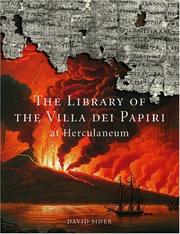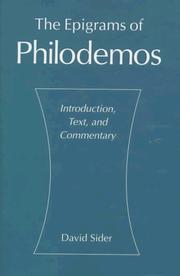| Listing 1 - 10 of 17 | << page >> |
Sort by
|

ISBN: 0892367997 9780892367993 Year: 2005 Publisher: Los Angeles Getty publications
Abstract | Keywords | Export | Availability | Bookmark
 Loading...
Loading...Choose an application
- Reference Manager
- EndNote
- RefWorks (Direct export to RefWorks)
The eruption of Mt. Vesuvius that destroyed Pompeii in A.D. 79 also buried nearby Herculaneum. Over time the location of the small town was forgotten. Shortly after its rediscovery in the 1730s, excavations--more likely treasure hunts--were organized that unearthed ancient sculptures that had survived the disaster. The richest finds were from a villa that came to be called the Villa dei Papiri, because it also yielded upward of a thousand papyrus rolls--the only library ever to have been recovered from the classical world. To the great excitement of contemporaries, the papyri held out the tantalizing possibility of the rediscovery of lost masterpieces by classical writers. Written for the general reader, this introduction to the ancient library describes the long and difficult history of attempts to unwind the damaged rolls. Sider discusses the texts that have been deciphered and puts them in the context of literacy and Roman society of the time. He describes the how the ancient books were created from papyrus, and provides an account of attitudes toward books in Greece and Rome. He also surveys the private and civic libraries of the ancient world. This thoroughly researched and engaging book will be enjoyed by any reader with an interest in classical studies.
Book history --- Archeology --- Herculaneum --- Private libraries --- Manuscripts, Greek (Papyri) --- Bibliothèques privées --- Papyrus grecs --- Piso Caesoninus, Lucius Calpurnius --- Library. --- Villa of the Papyri (Herculaneum) --- Herculaneum (Extinct city) --- Herculanum (Ville ancienne) --- 091.141 --- Papyri --- 091.141 Papyri --- Villa of the Papyri (Herculaneum). --- Herculaneum (Extinct city). --- Bibliothèques privées --- Home libraries --- Libraries, Private --- Libraries --- Book collectors --- Caesoninus, Lucius Calpurnius Piso --- Piso, L. Calpurnius --- Ercolano (Extinct city) --- Herculaneum (Ancient city) --- Italy --- Antiquities --- papyri [manuscripts] --- bookstocks --- Manuscripts [Greek ] (Papyri) --- Private libraries - Italy - Herculaneum (Extinct city) --- Manuscripts, Greek (Papyri) - Italy - Herculaneum (Extinct city) --- Piso Caesoninus, Lucius Calpurnius - Library.
Book
ISBN: 9780472053131 0472053132 9780472073139 Year: 2017 Publisher: Ann Arbor University of Michigan Press
Abstract | Keywords | Export | Availability | Bookmark
 Loading...
Loading...Choose an application
- Reference Manager
- EndNote
- RefWorks (Direct export to RefWorks)
"This collection of texts is designed to supplement those currently available for use in courses on Hellenistic poetry. Most have never before appeared in a similar collection; several have only recently been discovered. The individual commentaries have been written by the leading international scholars on Hellenistic poetry, and are designed to help the reader with more difficult aspects of the language, as well as to provide some basic guidance to each poem’s literary value and relevant scholarship. The text of each poem is presented, together with basic help on obscure vocabulary, morphology, dialect, meter, syntax, and similar philological issues. The modern commentators also offer guidance on a poem’s literary significance and a brief introduction to the scholarship. Among the 44 named and anonymous poets represented here are Apollonius of Rhodes, Archimedes, Aristotle, Callimachus, Cercidas, Corinna, Eratosthenes, Erinna, Ezekiel, Hermesianax, Herodas, Lycophron, and Phanocles. Contributors to the volume in addition to David Sider include: Silvia Barbantani, James Clauss, Dee Clayman, Christophe Cusset, Claudio De Stefani, Marco Fantuzzi, Andrew Ford, Kathryn Gutzwiller, Johanna Hanink, Regina Hoeschele, Richard Hunter, David Konstan, Pauline LeVen, Kelly MacFarlane, Enrico Magnelli, Jackie Murray, Pura Nieto, Maria Noussia, Douglas Olson, Floris Overduin, Richard Rawles, Ralph Rosen, Chad Schroeder, Alexander Sens, Evina Sistakou, Michael Tueller, and Athanassios Vergados. Although designed primarily as a textbook for graduate students and upper-level undergraduates, the book offers texts and subsidiary information not easily found (if at all) elsewhere. Since Latin poets made constant allusion to Hellenistic poetry, it will also be an important resource for Latinists." --Amazon.com.
Article
Abstract | Keywords | Export | Availability | Bookmark
 Loading...
Loading...Choose an application
- Reference Manager
- EndNote
- RefWorks (Direct export to RefWorks)
Book
ISBN: 3445021317 9783445021311 Year: 1981 Volume: Heft 118 Publisher: Meisenheim am Glan
Abstract | Keywords | Export | Availability | Bookmark
 Loading...
Loading...Choose an application
- Reference Manager
- EndNote
- RefWorks (Direct export to RefWorks)
History of philosophy --- Classical Greek literature --- Anaxagoras --- Translations into English --- Anassagora --- Anaksagor --- Anaxagoras, --- Ἀναξαγόρας, --- Translations into English. --- Anaxagoras - Translations into English

ISBN: 0195099826 0585333610 9780585333618 9780195099829 1280451637 9781280451638 0195356675 1602560730 0197704565 Year: 1996 Publisher: New York Oxford University Press
Abstract | Keywords | Export | Availability | Bookmark
 Loading...
Loading...Choose an application
- Reference Manager
- EndNote
- RefWorks (Direct export to RefWorks)
This is the first separate edition and commentary on Philodemos of Gadara (110-40 BC) since 1885, containing an introduction on Philodemos' life, poetic theory, metrical practice, and the place of the epigrams within the Greek Anthology.
Epigrams, Greek --- -Greek epigrams --- Translations into English --- Translations into English. --- Epigrammes grecques --- Traductions anglaises --- Epigrams [Greek ]
Book
ISBN: 9783110331165 Year: 2013 Volume: 14 Publisher: Berlin : De Gruyter,
Abstract | Keywords | Export | Availability | Bookmark
 Loading...
Loading...Choose an application
- Reference Manager
- EndNote
- RefWorks (Direct export to RefWorks)
Heraclitus, --- Héraclite d'Éphèse, --- Pythagore, --- Pythagoras. --- Pythagoras --- Pythagore
Book
ISBN: 3896652931 Year: 2005 Publisher: Sankt Augustin Academia-Verl.
Abstract | Keywords | Export | Availability | Bookmark
 Loading...
Loading...Choose an application
- Reference Manager
- EndNote
- RefWorks (Direct export to RefWorks)
Filosofie. --- Anaxagoras --- Anassagora --- Anaksagor --- Anaxagoras, --- Ἀναξαγόρας,
Book
ISBN: 9780198850793 0198850794 Year: 2020 Publisher: Oxford : Oxford university press,
Abstract | Keywords | Export | Availability | Bookmark
 Loading...
Loading...Choose an application
- Reference Manager
- EndNote
- RefWorks (Direct export to RefWorks)
Simonides of Ceos, one of the nine lyric poets enshrined in what is conventionally thought of as the Hellenistic Lyric Canon, is a relatively mysterious figure despite his renown in the classical world. Few historical and biographical facts about him have survived, and only fragments of his non-epigrammatic poetry.0This volume is intended to complement Orlando Poltera's full-scale text and commentary on Simonides' lyrics (Schwabe, 2008), offering an up-to-date edition and commentary covering, for the most part, those poems in elegiac distichs now called epigrams and elegies. In addition to these forms, Simonides wrote in a few other non-lyric metrical patterns involving dactyls and iambs: these are also included for the sake of completeness, since they are properly absent from Poltera's edition. 0As authenticity is in question for all but a very few of the epigrams ascribed to Simonides, the volume's scope extends to cover every poem ascribed to him in antiquity, including some poems that are surely not by him: these poems have never before been treated in such detail and the large body of scholarship generated by the corpus as a whole is taken into account here for the first time. Each poem and fragment is accompanied by a new English translation, where applicable, and detailed0exegetic line-by-line commentary; a comprehensive general Introduction sets Simonides and his works into their historical context and provides a thorough examination of the textual transmission of the elegies and epigrams.
Epigrams, Greek --- Elegiac poetry, Greek --- Greek elegiac poetry --- Greek poetry --- Simonides, --- Simonide, --- Simonides Ceus --- Simonides van Keos --- Simonides --- Simonides lyricus --- Simonide de Céos
Book
ISBN: 1942495455 1942495439 Year: 2022 Publisher: Dakota Dunes, South Dakota : Parnassos Press - Fonte Aretusa,
Abstract | Keywords | Export | Availability | Bookmark
 Loading...
Loading...Choose an application
- Reference Manager
- EndNote
- RefWorks (Direct export to RefWorks)
Philosophy, Ancient. --- Ancient philosophy --- Greek philosophy --- Philosophy, Greek --- Philosophy, Roman --- Roman philosophy
Book
Abstract | Keywords | Export | Availability | Bookmark
 Loading...
Loading...Choose an application
- Reference Manager
- EndNote
- RefWorks (Direct export to RefWorks)
| Listing 1 - 10 of 17 | << page >> |
Sort by
|

 Search
Search Feedback
Feedback About UniCat
About UniCat  Help
Help News
News